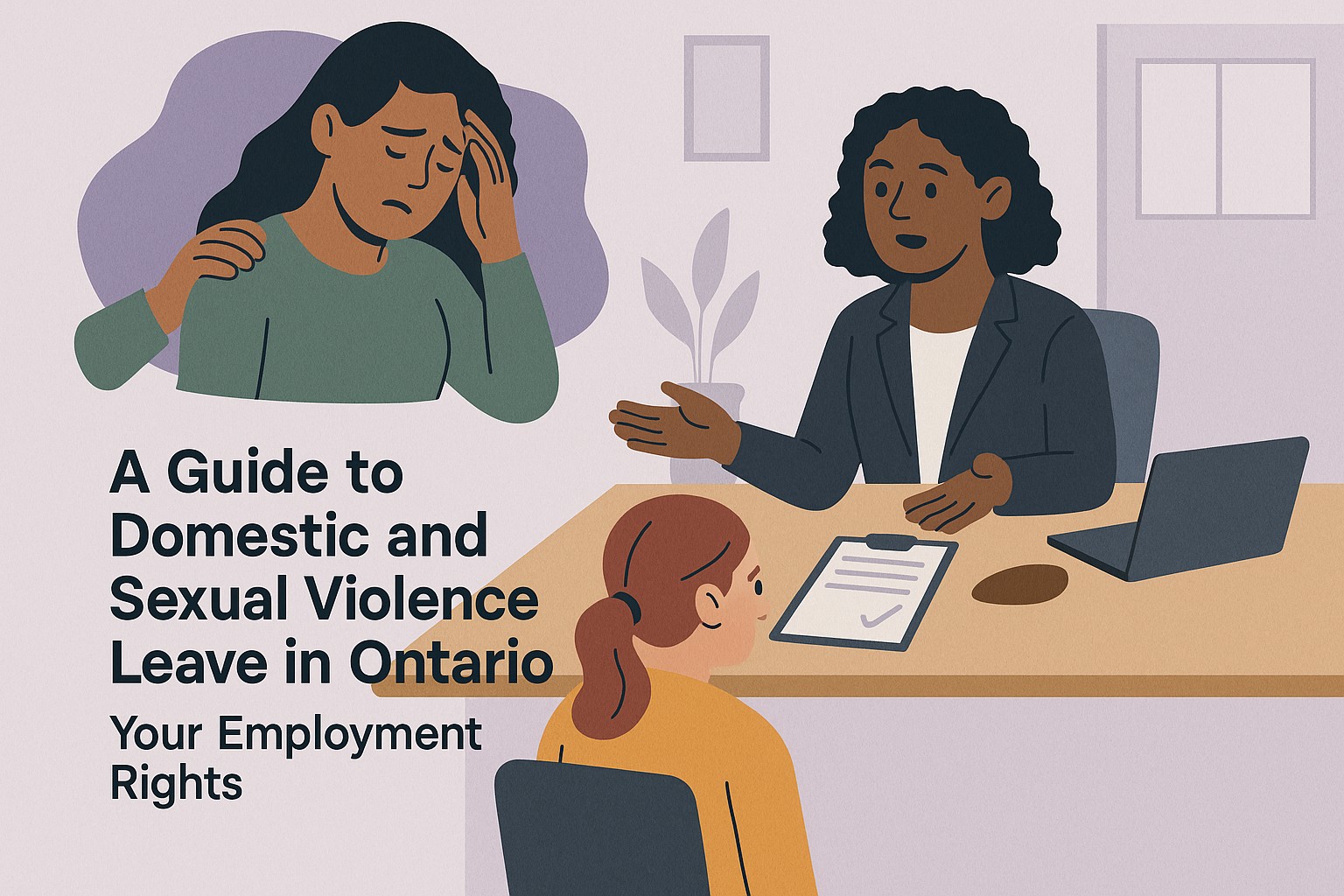A Guide to Domestic and Sexual Violence Leave in Ontario: Your Employment Rights
In Ontario, you do not have to choose between your job and your safety. The **Employment Standards Act** provides **Domestic and Sexual Violence Leave**—a job-protected entitlement for survivors of abuse. Our guide explains how eligible employees can take up to 10 days of leave (the first 5 are paid) and up to 15 weeks of unpaid leave to attend court, get counselling, or move.

Dealing with the aftermath of domestic or sexual violence requires time and energy. Attending court, seeing a doctor, finding a new place to live, or getting counselling all happen during business hours. For a survivor, worrying about losing their job should not be an added stress.
As you’ve noted, Ontario’s Employment Standards Act (ESA) provides a specific, protected leave for this exact purpose. The Domestic or Sexual Violence Leave is a critical right that gives an employee job-protected time off to handle the urgent health, safety, and legal issues that arise from abuse.
This guide explains your entitlements, how to request the leave, and what your rights are.
What is Domestic and Sexual Violence Leave?
This is a job-protected leave of absence available to employees in Ontario who have experienced, or are facing the threat of, domestic or sexual violence. It can be used by an employee if the abuse was directed at them or at their child.
The key purpose is to allow an employee to take necessary time away from work without fear of being fired or penalized.
Your Entitlement: Paid Days and Unpaid Weeks
The leave is broken into two distinct parts. An eligible employee is entitled to take, in each calendar year:
- Up to 10 days of leave. The first five days of this leave are paid at the employee's regular rate of pay. The next five days are unpaid.
- Up to 15 weeks of leave. This portion of the leave is unpaid.
The 10 days can be taken in full days or in parts of days, intermittently as needed. The 15 weeks of unpaid leave can be taken as a continuous block or in separate periods of one or more weeks.
Who is eligible?
To be eligible, you must have been employed by your employer for at least 13 consecutive weeks.
What Can the Leave Be Used For?
You can take this leave for any of the following purposes for yourself or your child:
- To seek medical attention for physical or psychological injuries.
- To obtain victim services from a community organization.
- To receive psychological or other professional counselling.
- To relocate, either temporarily or permanently.
- To seek legal or law enforcement assistance, including preparing for or participating in any civil or criminal court proceeding related to the violence.
How to Request Leave From Your Employer: A Step-by-Step Guide
The process is designed to be straightforward and confidential.
Step 1: Give Notice to Your Employer
An employee must inform their employer that they will be taking the leave.
- You should provide notice before the leave begins, or if that’s not possible, as soon as you can after starting it.
- The notice can be given orally or in writing. It is always a good practice to send a simple email for your records (e.g., "I am writing to inform you that I will be taking a day of Domestic or Sexual Violence Leave on August 5, 2025.").
- You do not have to provide your employer with any details about the abuse or your situation. You only need to state the name of the leave you are taking.
Step 2: Provide Reasonable Evidence (Only If Requested)
Your employer has the right to ask you for "evidence reasonable in the circumstances" that you are eligible for the leave. This is a crucial point to understand.
- "Reasonable evidence" is NOT a demand for a police report, a sworn statement, or court documents. Your employer cannot force you to provide these.
- Reasonable evidence is a document that confirms you took the time off for one of the permitted purposes. Examples include:
- A letter or note from a doctor, counsellor, or therapist confirming an appointment.
- A letter from a victim services agency or a shelter worker.
- If you choose, you can provide a court document (like a Notice of Motion), but you are not required to.
Your employer is legally required to keep any information you provide confidential.
Your Rights Are Protected
The ESA provides strong protections for employees who take this leave.
- Right to Reinstatement: When your leave is over, your employer must give you back the same job you had before, or a comparable one if your old job no longer exists.
- Right to Be Free from Reprisal: It is illegal for your employer to intimidate, fire, discipline, or otherwise penalize you because you took, or plan to take, Domestic or Sexual Violence Leave.
This leave is a separate entitlement and does not replace or reduce your sick days, vacation time, or other leaves under the ESA.
Disclaimer: This guide provides general information about the law and is not legal advice. For specific advice on your situation, contact the Ministry of Labour's Employment Standards Information Centre or an employment lawyer.
